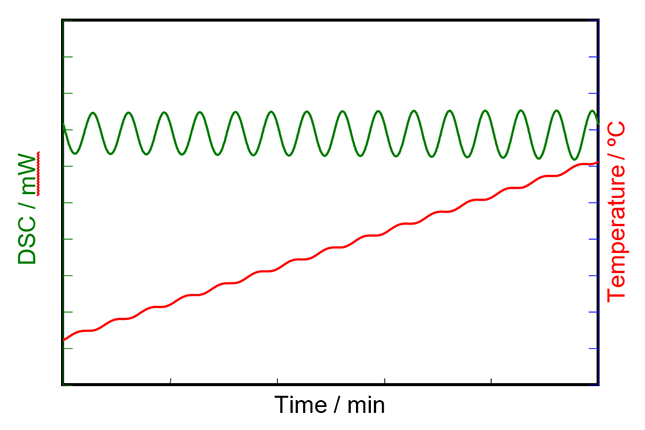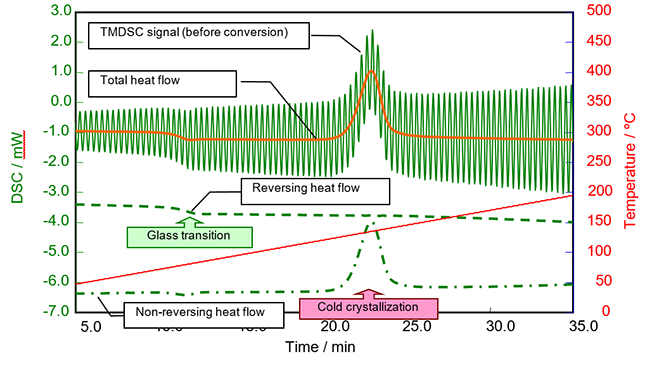The glass transition of polymer materials is one of the key influences on material properties and generally performed using DSC. However, identifying the glass transition is sometimes difficult when the glass transition and endothermic processes such as evaporation and enthalpy relaxation are overlapped in the same temperature range.
Temperature Modulated DSC (TM-DSC) is a technique that combines periodic temperature control performed by AC calorimetry, a technique that measures the specific heat capacity of a sample, and constant rate temperature control performed by DSC measurement. It’s effective for observing the glass transition clearly by separating the effects of non-reversing phenomenon such as evaporation and enthalpy relaxation.
Differential scanning calorimetry (DSC) is a thermal analysis technique in which the difference between the rate of heat flow into a specimen and that into a reference is measured as a function of temperature or time while the specimen and reference are subjected to the same temperature control program. DSC enables the measurements of the transition such as the glass transition, melting, and crystallization.
Chemical reactions such as thermal curing, heat history, specific heat capacity, and purity analysis are also measurable. Recently, with the development of the highly functional polymeric material, these thermal property analysis needs are increasing dramatically.
TM-DSC can simultaneously obtain heat capacity component (reversing heat flow) data that corresponds to the specific heat capacity, besides information obtained from DSC measurements, while heating a sample at a constant rate by repeating sinusoidal temperature control. Sample temperature is raised on average at a constant rate by repeated heating and cooling of the temperature in short time (Figure 1).

Figure 1. TM-DSC measurement results
The data equivalent to DSC curve provided from DSC measurement is called the total heat flow. Data of components not involved in specific heat capacity can be obtained by subtracting the heat capacity component from the total heat flow. This component data is called the kinetic component (non-reversing heat flow).
Because the glass transition changes the specific heat capacity of a material before and after, the DSC signal that corresponds to that change appears in the heat capacity component. On the other hand, phenomenon (irreversible phenomenon) observed as peaks, which include enthalpy change such as thermal curing reaction, cold crystallization, vaporization, or volatilization appear in the kinetic component (Table 1).
| Specific Heat Component | Kinetic Component |
| Glass transition | Evaporation Crystallization Curing Decomposition, etc. |
Table 1 Classification of DSC Measurement Phenomena
TM-DSC can retrieve by a single measurement data not obtained by conventional methods separated into a heat capacity component and kinetic component. These can be separated when the glass transition and other irreversible phenomenon overlap. Also, when two or more measurements were needed in the past because of water evaporation or elimination of thermal history, measurement efficiency has improved because data can be obtained with a single measurement.
Here’s the advantages of using TM-DSC:
Figure 2 shows a measurement example of a polyethylene terephthalate (PET) of amorphous by TM-DSC. The total heat flow is the same result obtained using conventional DSC. Shifting due to glass transition at 75 to 82°C and exothermic peak from cold crystallization at 132°C are observed in the total heat flow. Glass transition is observed in the heat capacity component; and cold crystallization is observed in the kinetic component. Accordingly, phenomena measured by DSC are divided into a heat capacity component and kinetic component.

Figure 2. TM-DSC conversion results for amorphous PET
With our NEXTA DSC, TM-DSC measurement mode and analysis of separation into a heat capacity component and kinetic component are available without any additional software, as it includes all the advanced functions into the software for NEXTA package.
Our NEXTA DSC Series instruments offer world-class sensitivity and baseline reproducibility, delivering more accurate testing and the ability to evaluate even the smallest thermal events. The DSC200 offers leading technology for routine applications without limitations and ideal for a wide variety of applications. The DSC600 is purpose designed to meet the most advanced materials development and failure analysis thanks to its sensitivity and resolution, especially within applied research. Our innovative Real View® camera system integrates seamless with NEXTA DSC Series and provides real-time observation during measurement.
Find out more